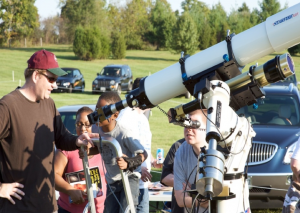The Ursids is a minor meteor shower producing about 5-10 meteors per hour. It is produced by dust grains left behind by comet Tuttle, which was first discovered in 1790. The shower runs annually from December 17-25. It peaks this year on the the night of the 21st and morning of the 22nd. This year the glare from the full moon will hide all but the brightest meteors. If you are extremely patient, you might still be able to catch a few good ones. Best viewing will be just after midnight from a dark location far away from city lights. Meteors will radiate from the constellation Ursa Minor, but can appear anywhere in the sky.
The winter solstice is the shortest day of the year, respectively, in the sense that the length of time elapsed between sunrise and sunset on this day is a minimum for the year. Of course, daylight saving time means that the first Sunday in April has 23 hours and the last Sunday in October has 25 hours, but these human meddlings with the calendar and do not correspond to the actual number of daylight hours.
If you life in the southern hemisphere, this is your Summer Solstice, celebrating the longest day of the year.
http://scienceworld.wolfram.com/astronomy/WinterSolstice.html

Head over to the Astronomy Day page for more information.

NOVAC is cancelling in-person events through May 10 in accordance with CDC recommendations.
Head over to the Astronomy Day page for more information.

Event is confirmed! See you tonight!
RSVP here.
Join NOVAC members who will be on hand to share views of the night sky including Mars, star clusters, the Milky Way, and many other deep sky objects.
Activities during Astronomy Day will include a telescope meet and greet, solar observing, a guided sky tour, night sky observing, and other demonstrations.
Feel free to walk around and enjoy the views of objects through a variety of telescopes on the field. Please ask the owner before using a telescope. If you have young children, please watch them around expensive astronomical equipment. Remember, telescope mirrors are sensitive to cigarette smoke and bug spray. Pets should also not be brought onto the observing field.
No astronomy experience or equipment is necessary to attend. If you have your own equipment, feel free to bring them along, even if it’s just a pair of binoculars.
For lighting, cover a flashlight in red cellophane (the darker the better). Bring along water to keep hydrated and plan on staying the entire evening or as long as the weather allows. Please dim your vehicles headlights when arriving and departing.
Crockett Park charges $7 per vehicle if you’re not a Fauquier County resident. However the event itself is completely free. NOVAC members are admitted free upon presentation of a membership card (available from the members-only section of the website). If you’re not a member but would like to become one, you can join the club online and print your membership card in only a few minutes.
Note: Masks are required throughout the event. This event is also weather-dependent and may be cancelled because of significant cloud cover or precipitation.

